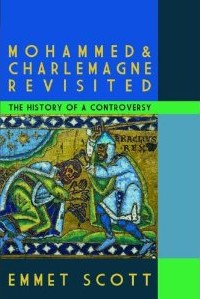Very challenging book by historian E. Scott:
Mohammed and Charlemagne Revisited: The History of a Controversy
https://wikiislam.net/wiki/Mohammed_and_Charlemagne_Revisited_-_The_History_of_a_Controversy

It is based on Pirenne study "Mohammed et Charlemagne" (1937)
"During the 1920s Belgian historian Henri Pirenne came to an astonishing conclusion:
the ancient classical civilization, which Rome had established throughout Europe and the Mediterranean world, was not destroyed by the Barbarians who invaded the western provinces in the fifth century, it was destroyed by the Arabs, whose conquest of the Middle East and North Africa terminated Roman civilization in those regions and cut off Europe from any further trading and cultural contact with the East. According to Pirenne, it was only in the mid-seventh century that the characteristic features of classical life disappeared from Europe, after which time the continent began to develop its own distinctive and somewhat primitive medieval culture."
For Scott,
"the evidence shows that classical civilization was not dead in Europe at the start of the seventh century, but was actually experiencing something of a revival. Populations and towns were beginning to grow again for the first time since this second century – a development apparently attributable largely to the spread of Christianity. In addition, the real centres of classical civilization, in the Middle East, were experiencing an unprecedented Golden Age at the time, with cities larger and more prosperous than ever before. Excavation has shown that these were destroyed thoroughly and completely by the Arab conquests, with many never again reoccupied. And it was precisely then, says Scott, that Europe’s classical culture also disappeared, with the abandonment of the undefended lowland villas and farms of the Roman period and a retreat to fortified hilltop settlements; the first medieval castles.
For Scott, archaeology demonstrated that the Arabs did indeed blockade the Mediterranean through piracy and slave-raiding, precisely as Pirenne had claimed, and he argues that the disappearance of papyrus from Europe was an infallible proof of this. Whatever classical learning survived after this time, says Scott, was due almost entirely to the efforts of Christian monks. "
...
According to Scott archaeological evidence indicates a sudden wave of massive destruction throughout the entire Mediterranean region in the seventh century of our era that can hardly be attributed to anything other than the Arab conquests?
If we follow Pirenne and Scott, termination of Greco-Roman civilization seems to coincide with the rise of Islam.
How much is it valid? What are pros and cons of Pirenne & Scott groundbreaking? Views, contestations, confirmations, etc...
Mohammed and Charlemagne Revisited: The History of a Controversy
https://wikiislam.net/wiki/Mohammed_and_Charlemagne_Revisited_-_The_History_of_a_Controversy

It is based on Pirenne study "Mohammed et Charlemagne" (1937)
"During the 1920s Belgian historian Henri Pirenne came to an astonishing conclusion:
the ancient classical civilization, which Rome had established throughout Europe and the Mediterranean world, was not destroyed by the Barbarians who invaded the western provinces in the fifth century, it was destroyed by the Arabs, whose conquest of the Middle East and North Africa terminated Roman civilization in those regions and cut off Europe from any further trading and cultural contact with the East. According to Pirenne, it was only in the mid-seventh century that the characteristic features of classical life disappeared from Europe, after which time the continent began to develop its own distinctive and somewhat primitive medieval culture."
For Scott,
"the evidence shows that classical civilization was not dead in Europe at the start of the seventh century, but was actually experiencing something of a revival. Populations and towns were beginning to grow again for the first time since this second century – a development apparently attributable largely to the spread of Christianity. In addition, the real centres of classical civilization, in the Middle East, were experiencing an unprecedented Golden Age at the time, with cities larger and more prosperous than ever before. Excavation has shown that these were destroyed thoroughly and completely by the Arab conquests, with many never again reoccupied. And it was precisely then, says Scott, that Europe’s classical culture also disappeared, with the abandonment of the undefended lowland villas and farms of the Roman period and a retreat to fortified hilltop settlements; the first medieval castles.
For Scott, archaeology demonstrated that the Arabs did indeed blockade the Mediterranean through piracy and slave-raiding, precisely as Pirenne had claimed, and he argues that the disappearance of papyrus from Europe was an infallible proof of this. Whatever classical learning survived after this time, says Scott, was due almost entirely to the efforts of Christian monks. "
...
According to Scott archaeological evidence indicates a sudden wave of massive destruction throughout the entire Mediterranean region in the seventh century of our era that can hardly be attributed to anything other than the Arab conquests?
If we follow Pirenne and Scott, termination of Greco-Roman civilization seems to coincide with the rise of Islam.
How much is it valid? What are pros and cons of Pirenne & Scott groundbreaking? Views, contestations, confirmations, etc...




